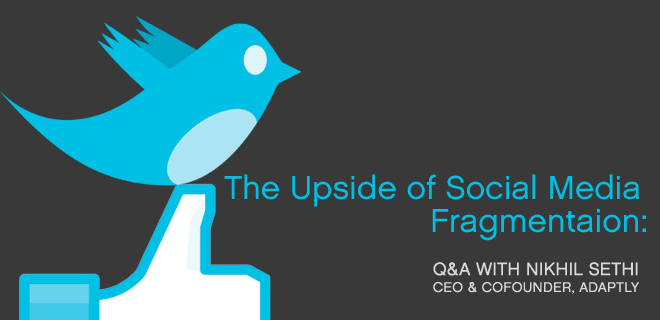
Normally in the digital advertising industry, we consider fragmentation a real drag: think online video advertising in Europe or the endless fountain of mobile platforms and devices. But Adaptly CEO & Founder Nikhil Sethi, who is presenting on social media buying at OPS London on May 15, says social media fragmentation is actually a kinda good thing. He was willing to tell us why in addition to explaining the thinking behind the creation of Adaptly, which just released its paid-media-and-content-blending Evergreen solution and scored $10.5 million in a Series B funding round.
What was the impetus for getting Adaptly off the ground – besides making lots of money and becoming the envy of your former classmates (which are perfectly valid rationales)? Why the name ‘Adaptly’?
Our goal was to solve a real problem, and create something new; something that never had existed before. We saw the social space booming and becoming extremely fragmented, making it very difficult for brands to stay ahead and continue to extend their messaging across social.
The name Adaptly arose when we realised that social was still in the very early stages of its existence. So early, in fact, that it was going to be changing, and evolving, from month to month. This meant that brands, as well as the technology encompassing social, would have to continue to ‘adapt’ to stay relevant.
I’ve been told that variety is the spice of life, so isn’t social media fragmentation a good thing?
Social media fragmentation is a GREAT thing. Ultimately, the definition of a social platform is something that recreates a natural human action and propels it digitally. Since our day-to-day lives are so complex, naturally there is no fit-all social platform solution to reflect reality in all its forms. Social media fragmentation is a natural result of many different ways of communicating and consuming media.
Social media ad-buying software isn’t necessarily required for all campaigns (e.g., a teenager looking to gain clients for their lawn-mowing service on Facebook). When should a media buyer truly consider partnering with a social media advertising tech company?
One of the very powerful things social has done has been to add a layer of democracy to everything. For example, my voice on social can be just as loud as Pepsi’s, and likewise, we’ve seen large governments topple using social as a powerful way to communicate. As a result, monetisation on social follows many of the same principles, and social media ad buying software should be much more focused on goals and strategies, rather than complex sets of tools handling the minute optimisation procedures required to buy media. A teenager’s need to use social effectively should be equally as important as that of a Fortune 500 brand. Social lets us achieve this.
How can data from social media ad campaigns be recirculated into an advertiser’s larger digital marketing initiatives?
One of the beauties of social is that it is highly based on first-party data. The accuracy of this data is nearly perfect, allowing me to really leverage this data in a powerful way. For every dollar spent in a paid capacity, data is spinning off as a consequence of the buy and can be collected and applied to several other initiatives as business intelligence, to the extent of creative learning – not just for digital campaigns – but for offline campaigns as well.
What are your thoughts on Tumblr’s recently announced advertising initiative, especially considering CEO John Karp’s recent comment that display was a ‘complete last resort’?
The concept of native advertising is really important. Whereas display advertising was built on the premise of real estate on web pages, native advertising in social is built around understanding how content moves within a given social system and how users consume and engage with this content.
Based on these behaviors, ad units can be designed to be one-to-one correlations of these natural user actions. Native advertising is the future and we are very supportive of Tumblr’s first indication of heading down a native advertising route.
 |
Get the latest on all things premium at OPS London, which will bring EU digital advertising leaders and ops professionals together to discuss and develop best practices for operational excellence. Register today for OPS London, which will be held May 15, 2012. |